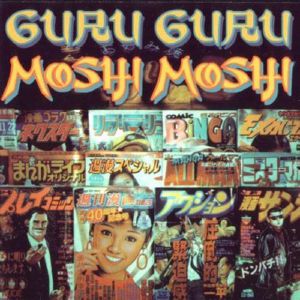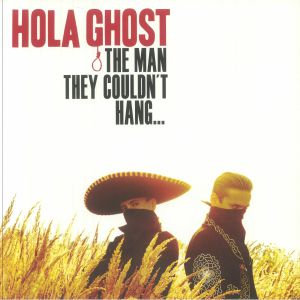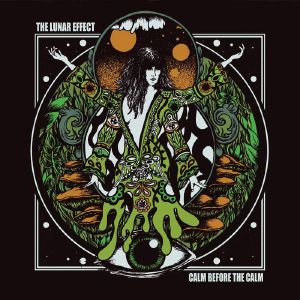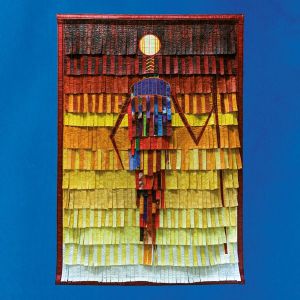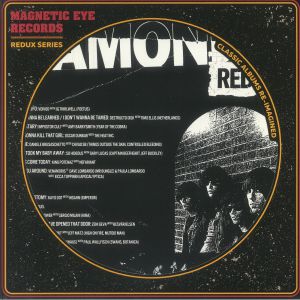New releases last two weeks: Psych/Garage Rock
Psych/Garage Rock vinyl released in the last two weeks4 Levels Of Existence (LP + insert with obi-strip)
Cat: GUESS 266. Rel: 11 Jun 25
! low stock ₺1.282,37
Pop Goes The Weasel (Record Store Day RSD 2025) (LP + booklet)
Cat: MR 469. Rel: 11 Jun 25
! low stock ₺1.003,53
Mellowmaker (yellow vinyl LP + MP3 download code)
Cat: FC 268V12. Rel: 05 Jun 25
Review: Black Market Karma return with the second chapter in their two-part Fuzz Club album series. Written, recorded, and produced by Stanley Belton, it's the imperfections and unplanned happenings that are the real joy of this ode to 1960s and 1970s psychedelic rock & roll will modern beats. A striking follow up to Wobble, it's fuzzy, crackly, angular and strikingly human considering it's fundamentally electronic. "Mellowmaker was made immediately after Wobble, I kinda see them as two sides of each other", Belton has been quoted as saying. "With these two albums I've attempted to crystallise how it feels to be stuck between a feeling of amnesia of the soul and the earthly experience of piloting a meat suit... I'm still chasing that longing intangible 'Hiraeth' feeling. The sense of wanting to find our way home to a place that maybe doesn't exist."
… Read more in stock ₺970,34
in stock ₺1.069,89
Violence Dimension (limited gatefold 'oxblood' red vinyl LP)
Cat: HPS 341LTD. Rel: 09 Jun 25
in stock ₺1.171,05
in stock ₺1.104,15
Drifting In The Endless Void (white & green merge vinyl LP)
Cat: BFR 025LPW. Rel: 06 Jun 25
in stock ₺1.271,13
Cat: DSL 109. Rel: 16 Jun 25
in stock ₺1.549,98
Played by: Ex-Friendly (Truth & Lies Music)
in stock ₺1.137,33
in stock ₺1.527,50
In The Shade Of The Living Light (LP + booklet)
Cat: CF 73. Rel: 03 Jun 25
in stock ₺1.248,65
In The Dawn Of November (clear vinyl LP + insert + Mp3 download code)
Cat: BFUN 411. Rel: 16 Jun 25
in stock ₺1.237,95
in stock ₺1.192,99
in stock ₺1.337,50
Moshi Moshi (reissue) (180 gram yellow vinyl LP + insert)
Cat: V 389. Rel: 12 Jun 25
in stock ₺1.037,24
The Sky Will Remember/To Leave A Single Wolf Alive (gatefold 180 gram 'galaxy fire' & 'galaxy sky' vinyl 2xLP)
Cat: TSWRCOLOUR. Rel: 16 Jun 25
in stock ₺2.341,56
in stock ₺1.393,70
Nocturne (gatefold 2xLP + insert (side 4 laser-etched))
Cat: PRO 407LP. Rel: 09 Jun 25
in stock ₺1.494,32
Nocturne ("arctic pearl" vinyl 2xLP + insert + poster (side 4 laser-etched))
Cat: PRO 407LPC1. Rel: 09 Jun 25
in stock ₺1.862,01
in stock ₺802,29
The Man They Couldn't Hang (translucent red vinyl LP)
Cat: SRE 331LPREB1. Rel: 12 Jun 25
in stock ₺1.025,47
in stock ₺992,29
Beneath It All (black & brown marbled vinyl LP + insert)
Cat: REX 2504LPB. Rel: 06 Jun 25
in stock ₺1.137,33
An Orphan Form (clear in purple & black splattered vinyl LP + MP3 download code limited to 300 copies)
Cat: REPOSELP 147. Rel: 03 Jun 25
Review: We find ourselves lost in kosmische textures, dark jazz motifs and brushup drums, as Ivan The Tolerable (Oli Heffernan) edges us ever deeper into his singular sonic world with An Orphan Form, where wide scapes and underbrushed moodiness leaves us in an identifiable yet not entirely placeable place. There's a sense of constant movementicircular rather than linearias the music unfurls like a dream slipping just out of reach. Synth lines wobble and stretch, field recordings emerge from the mist, and the sounds of nature act as subtle anchors amid the abstraction. It's a spiritual detour after the cheekier tonalities of his various earlier cassette albums for the likes of Cruel Nature and Ack! Ack! Ack!.
… Read more in stock ₺1.037,24
Review: What's that strange rock formation over there? Phantom Island hears King Gizzard And The Lizard Wizard burrow back into their sprawling underworld Gizzverse, mixing hallucinatory narratives and a restrained sonic palette, all while returning their rock operatic thematic hand to the cartographic myth of phantom islands. First intended to lead their album Flight b741, the song (come album) took on a life of its own, and just had to be released separately. Pepys Island and Antillia are a but a few of the mythological backbones of this miraging rock masterpiece, intuiting the story of a pilot touching down on a dreamlike island, only to find the passengers unraveling into visions of gods and beasts.
… Read more in stock ₺1.137,33
Music To Kill Bad People To: Demos & Rarities Volume 1 ("red velvet" vinyl LP)
Cat: OGIC 2290RV1. Rel: 13 Jun 25
in stock ₺1.304,85
Calm Before The Calm (gatefold translucent magenta vinyl LP)
Cat: SRELPB 1743. Rel: 12 Jun 25
in stock ₺1.025,47
Psychic Meditation Music (white vinyl LP (indie exclusive))
Cat: NUM 12474LPC2. Rel: 12 Jun 25
in stock ₺1.259,89
Psychic Meditation Music (LP + insert)
Cat: NUM 12474LP. Rel: 12 Jun 25
in stock ₺1.237,95
Cat: 541416 668486. Rel: 05 Jun 25
in stock ₺1.337,50
Mr Norris Changes Brains: Chapter 1 (2xLP + insert)
Cat: 541416 668485. Rel: 05 Jun 25
in stock ₺1.337,50
Cat: 541416 668487. Rel: 05 Jun 25
in stock ₺1.337,50
in stock ₺1.694,49
in stock ₺702,74
Kapaim (limited gold & black splattered vinyl LP + MP3 download code)
Cat: BTR 121LP. Rel: 05 Jun 25
Review: The Middle East has always invoked a sense of wonder and escapism, even if a singular tag for a vast and varied global region is an instant disservice. So it's not much of a surprise to find many countries currently in the throes of an explosive rediscovery of psychedelic sounds. Ouzo Bazooka is just one example of the kind of bands we're talking about. Originally solo project from Uri Brauner Kinrot - a musician, scientist and producer - the vehicle quickly grew into the fully fledged group we have loved over the last five albums and ten years, give or take. Widely considered pioneers of the burgeoning scene, Kapaim (Hebrew for 'palms') cements their status as a cut above most psyche rock bands anywhere on the planet. Informed by jazz, soul, blues, and indigenous musical traditions of the South Eastern Mediterranean, it's a smooth and intoxicating ride.
… Read more in stock ₺891,67
in stock ₺1.104,15
in stock ₺1.192,99
Die Healing (trifold numbered red marbled vinyl LP box set + insert + poster limited to 110 copies)
Cat: SM 55170522BOX. Rel: 05 Jun 25
in stock ₺5.252,05
in stock ₺1.203,70
Review: Helsinki-based sextet Soft Power return with their fourth release i a richly detailed and expansive jazz-rock record that confirms their standing as one of Finland's most original ensembles. Formed in 2015, the group continues to push forward with a sound rooted in Nordic jazz and progressive traditions, but always shaped by clarity, control and sharp melodic thinking. It's a new release that leans into modal harmony, rhythmic intricacy and instrumental colour, without ever tipping into excess. 'Zeppelin' unfurls with measured power, while the title track 'Space To Breathe' delivers a slow, immersive build full of harmonic subtlety and textural weight. Lush electric keys and layered horns give the record its warmth, while tight ensemble playing keeps the edges crisp. There's a sense of atmosphere here that's as important as any solo or theme i a carefully built tension between groove, abstraction and mood. Without falling into pastiche, the band channel the mysticism of 70s European fusion and reshape it for the present, offering a record that's cool, grounded and quietly complex. A standout addition to the Finnish jazz-rock catalogue and a clear sign that this group continues to grow with purpose.
… Read more in stock ₺1.259,89
Authentique Vol 2 ('psychedelic shadow' vinyl LP (indie exclusive))
Cat: NUM 824LPC2. Rel: 05 Jun 25
Review: This is the sound of Malian guitar mastery at its peak as Zani Diabate's Super Djata Band channelled raw magic on their 1981 album. Blending Wasulu hunter traditions, griot storytelling, Senufo dances and Fula and Mandingo sounds with psychedelic rock, blues and Afrobeat, the Bamako-based orchestra delivers a genre-bending sonic trip that more than stands up. This is where tradition meets wah-wah pedal wizardry across six electrifying tracks that blaze with intensity and infectious groove. It outlines a revolutionary sound forged for the people, by the people and in the 1980s, few bands matched their fire- could should still the same today, to be fair.
… Read more in stock ₺1.304,85
in stock ₺1.237,95
in stock ₺1.047,95
Ali (limited gatefold 'halcyon' vinyl LP)
Cat: DOC 274LPC3. Rel: 12 Jun 25
Review: Ali brings together Malian guitarist and singer Vieux Farka Toure with Houston-based trio Khruangbin for pattern-textured tribute to Vieux's father, the legendary Ali Farka Toure. The group chose to reinterpret Ali's music, drawing on a shared sense of space and groove to honour his legacy without embalming it. Recorded in just a week in a barn in Burton, Texas, the sessions came steeped in warmth and mutual respect, with the final tracklist curated by Ali's eleven children. Khruangbin's dusky, reverb-heavy style embed the earthy, cyclical patterns of the recently popularised Malian desert blues, each side subtly reshaping the other sound while drawing parallels between North American and West African takes on the same name. Though long delayed by the pandemic, what has emerged is an unhurried traditional group mind, invoked to tread newer ground in songs erstwhile deemed well-trodden.
… Read more! low stock ₺1.069,89
Marc URSELLI / VARIOUS
Marc Urselli's Best Of Ramones: Redux (gatefold silver marbled vinyl LP in die-cut sleeve)
Cat: MER 129LPB1. Rel: 06 Jun 25
in stock ₺1.416,18
Marc URSELLI / VARIOUS
Marc Urselli's Ramones: Redux (gatefold pink & white marbled vinyl LP)
Cat: MER 123LPB1. Rel: 06 Jun 25
Boots Electric - "I Wanna Be Your Boyfriend" (feat Jesse Hughes, Rex Roulette & Wayne Kramer) (2:08)
in stock ₺1.538,74
Marc URSELLI / VARIOUS
Marc Urselli's Best Of Ramones: Redux (gatefold clear vinyl LP in die-cut sleeve)
Cat: MER 129LP. Rel: 06 Jun 25
in stock ₺1.416,18
Review: The beatdown summer of 1967 saw to many an album-length caramelisation, among them US rockers Vanilla Fudge's self-titled debut album, which saw the band take an unconventional route to psych rock pinnacling success, leaning heavily on slowed-down, dramatically reimagined covers as opposed to original songwriting. The record pairs three brief instrumental interludes with expansive versions of pop tracks, most famously their rework of 'You Keep Me Hangin' On' (Holland-Dozier-Holland), which was released in an edited single version and charted in its own right. Despite some parts of the stereo LP being mixed in mono, the record climbed to number six on the US Billboard and found international success. Critics later noted its unorthodox structure: freeform intros, drawn-out vocal harmonies centred on the Hammond organ, and explosive closing jams. Polarising in style, we've a shiftless snapshot of late-60s American psych on our hands here, leaving us in no wonder as to why it was their most successful record.
… Read more in stock ₺1.114,85
Spirit Of '67 (reissue) (purple marbled vinyl LP)
Cat: CLOLP 6604. Rel: 12 Jun 25
in stock ₺1.248,65
VARIOUS
Marc Urselli's Ramones: Redux (white vinyl LP in die-cut sleeve)
Cat: MER 123LP. Rel: 09 Jun 25
in stock ₺1.594,40

 TRY
TRY



















